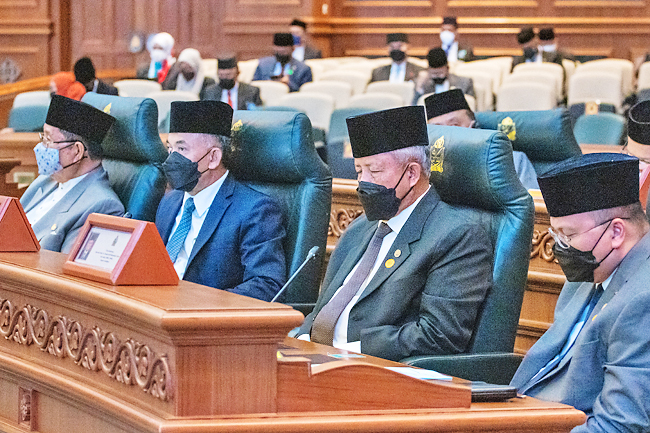Azlan Othman
The world economic landscape is still uncertain due to the spread of COVID-19. The direction of economic recovery is still unpredictable even with the availability of vaccines and vaccination programmes implemented globally. Concerns over the emergence of new variants have affected the travel as well as affect the economic recovery for any country.
This was said by Minister at the Prime Minister’s Office and Minister of Finance and Economy II Yang Berhormat Dato Seri Setia Dr Awang Haji Mohd Amin Liew bin Abdullah when deliberating the proposed budget for financial year 2022-2023 on the third day of the 18th Legislative Council (LegCo) session yesterday.
“The world economy was gloomy at the beginning of the COVID-19 outbreak in 2020 as a result of the implementation of the great lockdown’ to contain the pandemic.
World economic growth slowed by negative 3.1 per cent following the closure of several economic sectors in an effort to curb the spread of the pandemic. Rising unemployment has also had a negative impact, especially in the aviation and hospitality sectors. At the same time, oil-exporting countries are also facing challenges such as falling global oil prices, and declining demand market for fossil fuels.” “This,” the minister said, “has spurred the commitment of some countries to decarbonisation or green recovery and the widespread change in green technology has gradually made renewable energies the energy of choice”.
The emergence of the Delta variant in 2021 undermined the momentum of recovery, but adjustment to new norms and continued support and stimulus in large economies allowed the global economy to rebound.
In the World Economic Outlook (WEO) report released in October 2021, the International Monetary Fund (IMF) predicted that global economic growth will increase by 4.9 per cent in 2022.
However, following the emergence of the new Omicron variant as well as continued disruptions to the global supply chain, the IMF in its WEO report released in January lowered its global economic growth forecast this year to 4.4 per cent. Meanwhile, economic growth in Asia, especially emerging and developing Asia (China, India & ASEAN-5) is projected at 5.9 per cent compared to 6.3 per cent.
“The IMF also predicts that global trade volume will grow at a rate of six per cent in 2022, compared to 9.3 per cent in 2021.”






